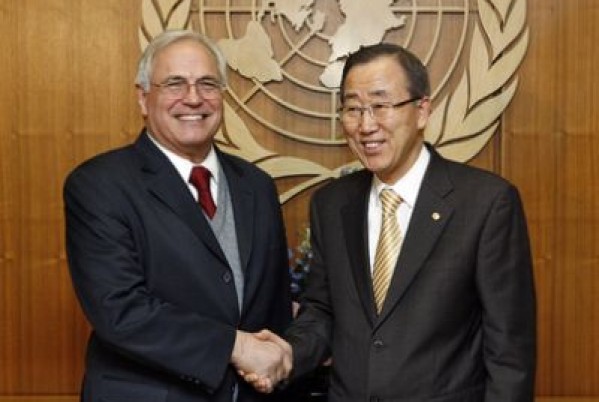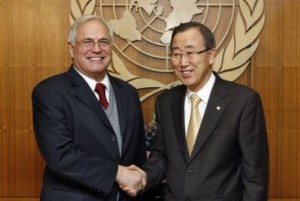Inner city Press
The UN Security Council closed door meeting on Western Sahara, French Ambassador Francois Delattre and his Russian counterpart Vitaly Churkin came out. The former quickly left — earlier when Inner City Press asked what, “What about Chissano?” he’d said, “I’ll have to get back to you” — but Churkin stopped and spoke.
On Western Sahara, Churkin said that “the tone of the consultations tells me that these expert discussion are not going to be easy. Tomorrow the vote cannot take place. We’ll try on Friday, or Saturday. Some Council members did not feel it was strong enough. We need to continue the mandate and we do believe it should be returned to its full capacity…. There is always room for improvement… some delegations will express this view in much stronger terms.”
So here now from diplomatic sources is the updated Group of Friends draft:
Updated draft resolution on Western Sahara
The Security Council,
Recalling and reaffirming all its previous resolutions on Western Sahara,
Reaffirming its strong support for the efforts of the Secretary-General and his Personal Envoy to implement resolutions 1754 (2007), 1783 (2007), 1813 (2008), 1871 (2009), 1920 (2010), 1979 (2011), 2044 (2012), 2099 (2013), 2152 (2014), and 2218 (2015),
Reaffirming its commitment to assist the parties to achieve a just, lasting, and mutually acceptable political solution, which will provide for the self-determination of the people of Western Sahara in the context of arrangements consistent with the principles and purposes of the Charter of the United Nations, and noting the role and responsibilities of the parties in this respect,
Reiterating its call upon the parties and the neighbouring states to cooperate more fully with the United Nations and with each other and to strengthen their involvement to end the current impasse and to achieve progress towards a political solution,
Recognizing that achieving a political solution to this long-standing dispute and enhanced cooperation between the Member States of the Maghreb Arab Union would contribute to stability and security in the Sahel region,
Welcoming the efforts of the Secretary-General to keep all peacekeeping operations, including the United Nations Mission for the Referendum in Western Sahara (MINURSO), under close review and reiterating the need for the Council to pursue a rigorous, strategic approach to peacekeeping deployments, and effective management of resources,
Recognizing the important role played by MINURSO on the ground and the need for it to fully implement its mandate,
Expressing concern about the violations of existing agreements, and calling on the parties to respect their relevant obligations,
Taking note of the Moroccan proposal presented on 11 April 2007 to the Secretary-General and the serious and credible Moroccan efforts to move the process forward towards resolution; also taking note of the Polisario Front proposal presented 10 April 2007 to the Secretary-General,
Encouraging in this context, the parties to demonstrate further political will towards a solution including by expanding upon their discussion of each other’s proposals,
Taking note of the four rounds of negotiations held under the auspices of the Secretary-General and recognizing the importance of the parties committing to continue the negotiations process,
Encouraging the parties to resume cooperation with the Office of the High Commissioner for Refugees in implementing the January 2012 updated Plan of Action on Confidence Building Measures, including programs focused on linking people who have been divided for more than 40 years due to the conflict,
Stressing the importance of improving the human rights situation in Western Sahara and the Tindouf camps, and encouraging the parties to work with the international community to develop and implement independent and credible measures to ensure full respect for human rights, bearing in mind their relevant obligations under international law,
Encouraging the parties to continue in their respective efforts to enhance the promotion and protection of human rights in Western Sahara and the Tindouf refugee camps, including the freedoms of expression and association,
Welcoming in this regard, the recent steps and initiatives taken by Morocco, and the role played by the National Council on Human Rights Commissions operating in Dakhla and Laayoune, and Morocco’s interaction with Special Procedures of the United Nations Human Rights Council,
Commending the technical visit of the Office of the United Nations High Commissioner for Human Rights (OHCHR) to Western Sahara in April 2015, and to the Tindouf refugee camps in July-August 2015, and strongly encouraging full continuing cooperation with OHCHR, including through facilitating further visits to the region,
Recognizing the impact of torrential rains in October 2015 on the Tindouf refugee camps and welcoming the plan of the United Nations High Commissioner for Refugees to convene a donor briefing,
Reiterating its request for consideration of a refugee registration in the Tindouf refugee camps and inviting efforts in this regard,
Stressing the importance of a commitment by the parties to continue the process of negotiations through the United Nations-sponsored talks,
Recognizing that the consolidation of the status quo is not acceptable, and noting further that progress in the negotiations is essential in order to improve the quality of life of the people of Western Sahara in all its aspects,
Affirming full support for the Secretary-General’s Personal Envoy for Western Sahara Ambassador Christopher Ross and his work in facilitating negotiations between the parties, and, welcoming to that effect his recent initiatives and ongoing consultations with the parties and neighbouring states,
Affirming full support for the Special Representative of the Secretary-General for Western Sahara and Head of MINURSO Kim Bolduc,
Noting with concern that MINURSO’s ability to fully carry out its mandate has been affected as the majority of its civilian component, including political personnel, cannot perform their duties within MINURSO’s area of operations,
Having considered the report of the Secretary-General of 19 April 2016 (S/2016/355),
1. Decides to extend the mandate of MINURSO until 30 April 2017;
2. Emphasizes the urgent need for MINURSO to return to full functionality;
3. Requests the Secretary General to brief the Council within 120 days on whether MINURSO has returned to full functionality and expresses its intention, if MINURSO has not achieved full functionality, to consider how best to facilitate achievement of this goal;
4. Reaffirms the need for full respect of the military agreements reached with MINURSO with regard to the ceasefire and calls on the parties to adhere fully to those agreements;
5. Calls upon all parties to cooperate fully with the operations of MINURSO, including its free interaction with all interlocutors, and to take the necessary steps to ensure the security of as well as unhindered movement and immediate access for the United Nations and associated personnel in carrying out their mandate, in conformity with existing agreements;
6. Emphasizes the importance of the parties’ commitment to continue the process of preparation for a fifth round of negotiations, and recalls its endorsement of the recommendation in the report of 14 April 2008 (S/2008/251) that realism and a spirit of compromise by the parties are essential to achieve progress in negotiations;
7. Calls upon the parties to continue to show political will and work in an atmosphere propitious for dialogue in order to enter into a more intensive and substantive phase of negotiations, thus ensuring implementation of resolutions 1754 (2007), 1783 (2007), 1813 (2008), 1871 (2009), 1920 (2010), 1979 (2011), 2044 (2012), 2099 (2013), 2152 (2014), and 2218 (2015) and the success of negotiations;
8. Affirms its full support for the commitment of the Secretary-General and his Personal Envoy towards a solution to the question of Western Sahara in this context and calls for renewed meetings and strengthening of contacts;
9. Calls upon the parties to continue negotiations under the auspices of the Secretary-General without preconditions and in good faith, taking into account the efforts made since 2006 and subsequent developments, with a view to achieving a just, lasting, and mutually acceptable political solution, which will provide for the self-determination of the people of Western Sahara in the context of arrangements consistent with the principles and purposes of the Charter of the United Nations, and noting the role and responsibilities of the parties in this respect;
10. Invites Member States to lend appropriate assistance to these talks;
11. Requests the Secretary-General to brief the Security Council on a regular basis, and at least twice a year, on the status and progress of these negotiations under his auspices, on the implementation of this resolution, challenges to MINURSO’s operations and steps taken to address them, expresses its intention to meet to receive and discuss his briefings and in this regard, and further requests the Secretary-General to provide a report on the situation in Western Sahara well before the end of the mandate period;
12. Welcomes the commitment of the parties and the neighbouring states to hold periodic meetings with the Office of the United Nations High Commissioner for Refugees to review and, where possible, expand confidence-building measures;
13. Urges Member States to provide voluntary contributions to fund confidence-building measures agreed upon between the parties, including those that allow for visits between separated family members, as well as food programmes to ensure that the humanitarian needs of refugees are adequately addressed;
14. Requests the Secretary-General to continue to take the necessary measures to ensure full compliance in MINURSO with the United Nations zero-tolerance policy on sexual exploitation and abuse and to keep the Council informed, and urges troop-contributing countries to take appropriate preventive action including predeployment awareness training, and other action to ensure full accountability in cases of such conduct involving their personnel;
15. Decides to remain seized of the matter.








